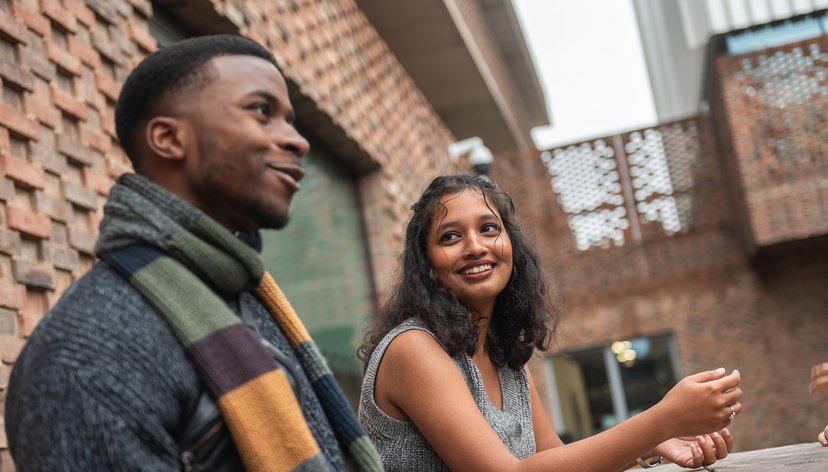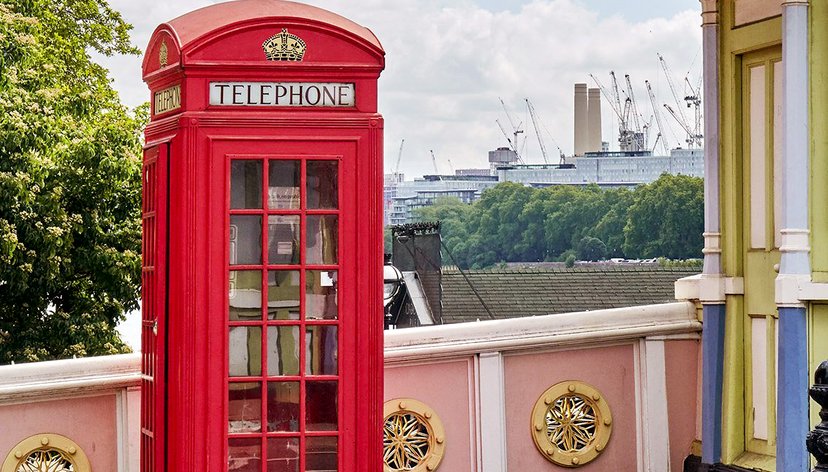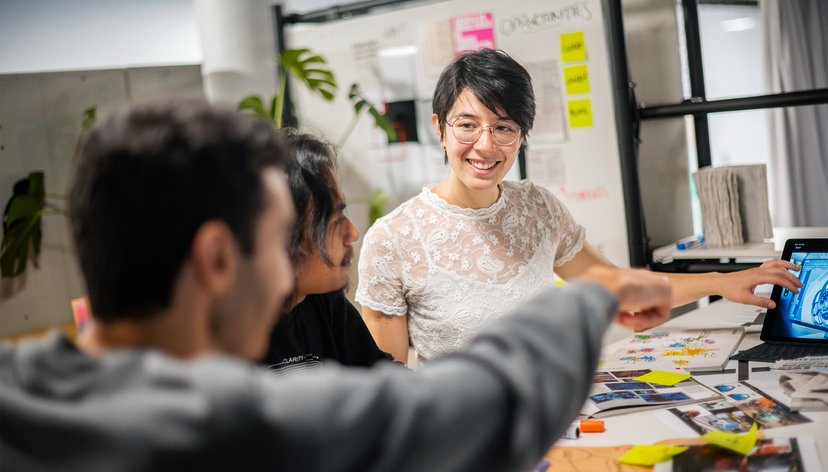Before you arrive in the UK
Jump to
Prepare for London life with our practical advice on moving to the UK.
Coming to the UK to study at the RCA is an exciting and life changing move. Whether you’re ready to dive into life in a new city or not too sure what to expect – the RCA is here to welcome and support you. To make the transition as smooth as possible, this guide provides information on the practical things you’ll need to consider before you arrive in the UK.
Remember, if you need help or have a specific question, you can always reach out to Our Student Support team.
Before leaving home
We’ve made a checklist of the key things to remember to do before leaving home below – referring back to this list will help you make sure you don’t overlook something important:
- Accept your RCA offer
- Pay your RCA deposit
- Make sure your passport is up to date
- Get your CAS (Confirmation of Acceptance for Studies)
- Apply for your Visa
- Book your accommodation if you are able to do so
- Have enough funds for your living costs
- Book your travel
When you leave for the UK, remember to bring:
- Your correct visa
- Key documents such as details of accommodation, your TB certificate (if applicable), and original qualifications. Keep these in your hand luggage for verification upon arrival in the UK. It’s good to have electronic copies of these documents available too just in case!
- Medical records of any pre-existing conditions (if applicable make sure they are translated into English)
- Approximately £1,000–2,000 on a prepaid currency card or credit card as you will not have a bank account in the UK until you have registered with the College
Arriving in London
Depending on where you arrive in the UK, you’ll need to navigate how to get to where you’re staying. It’s always good to have a clear idea of this before you set off so there are no surprises when you arrive. The information below covers London’s major international airports and international train station.
If you’re ever unsure and need some help with directions, you can always ask someone wearing a Transport for London (TfL) uniform or someone who works at the airport – most people recognise arriving in a new city can be daunting and are happy to help out someone in need.
Heathrow airport
Tube: The Piccadilly and Elizabeth lines run a regular service from Heathrow to a number of central destinations across London, including South Kensington and Kings Cross St Pancras. The tube is much cheaper than the Heathrow Express or the Heathrow Connect.
Heathrow Express
The Heathrow Express runs every 15 minutes directly to Paddington Station. Journey time is 15 minutes.
Gatwick airport
Train: The Gatwick Express runs every 15 minutes directly to Victoria Station. Journey time is 30. Cheaper, slower trains are also available to Victoria, London Bridge and City Thameslink stations, and take 35–45 minutes.
Stansted airport
Stansted Express: Runs every 15 minutes to Liverpool Street and Tottenham Hale. Journey time is 35 minutes to Tottenham Hale and 46 minutes to Liverpool Street.
Luton airport
Train: Thameslink trains run every 15 minutes directly to St. Pancras International, Blackfriars and London Bridge stations.
London City airport
Trains: DLR trains run regularly between London City Airport and central London.
Transport for London (DLR) website
St. Pancras International
International trains arrive at London’s St. Pancras International station, with direct access to Northern, Piccadilly, Victoria, Circle, Hammersmith & City and Metropolitan lines and national and regional railway services.
St. Pancras International website
Coaches from the airports
Several coach companies run regular services from Heathrow, Gatwick and Stansted Airport to Victoria. Journey times range from 40 minutes to 1 hour 40 minutes.
Uber or taxis
You may prefer to take a taxi or Uber from Heathrow Airport. Please also note that Black Cabs can be expensive, so ask how much it would cost to your destination before you get in. Comparing quotes and booking minicabs or taxis online will often be quicker and cheaper than by telephone.
International welcome
“It was my first time studying in London – being an international student in the city was transformative. Though a bit overwhelming at first, with research and using the support systems and network of the RCA, I was able to adjust quickly. I found the creative community in London to be really open, supportive and collaborative.”
At the beginning of the academic year during Welcome Week, the Student Support team and the RCA Student Union host events to welcome all incoming students. With a mix of formal and informal events like drinks, picnics and talks, you’ll be able to find an event that’s right for you where you can meet other students and staff and get a feel for living in London. During Welcome Week, you’ll also be able to meet people from different RCA Student Societies – these groups can help you connect with students with similar interests or even try a new hobby. Once you’re registered as an RCA student, you will be able to check the Intranet for upcoming events.
Opening a bank account
All international students should be eligible for a basic bank account in the UK. This type of account allows for services such as payment in and out of the account. It also allows for the use of ATMs or cash machines, so you can withdraw cash should you need it.
Before starting at the RCA, we suggest you have sufficient funds in a travel money card of £1,000–£2,000 or a credit card so that you can meet everyday expenses until your bank account becomes active.
Remember if you are going to deposit funds into a UK bank account, it can take time to clear before you withdraw the money: four to five working days for UK cheques and often 28 days or more if converting to another currency.
Why should I open a bank account?
Opening a bank account in the UK is the safest and most effective way of managing your money during your studies. This guide gives an overview of what to consider when choosing your account and the documents you will need to be able to provide in order to open one.
If you are unsure whether a UK bank account is right for you, this blog post from UK Council for International Student Affairs (UKCISA) explains why it can be helpful to open one.
What type of account can I open?
This will depend on the length of your course in the UK, as well as how you intend to use the account, as some accounts have restrictions or fees. It is important to understand any potential charges and the various features of the accounts.
- Those studying in the UK for less than one year will find fewer accounts available to them. One option is Metro Bank’s ‘Cash Account’ however this comes with restrictions in how you can use it. Santander offer students studying for less than a year their ‘International Student Current Account' which is a popular option.
- Students wanting to set up payment plans for their university fees, smartphone contract, or online subscriptions such as Netflix and Spotify should check the features of their chosen bank account. For example, Metro’s ‘Cash Account’ and Santander’s other ‘Basic Account’ don't allow pre-authorised payments such as these.
- Those who receive international transfers should consider either of the accounts offered by Santander, who do not charge a fee, whereas many other banks do.
- App-based banking is becoming a popular option, App-based banks such as Monzo offer current accounts which you can open up through their app.
- Those wanting to open an account quickly should plan ahead. Due to a large number of new students arriving in the London area during September, there are often long waiting times for appointments at certain banks. Some students reported wait times of up to six weeks for in-person appointments during September and October.
What documents will I need?
To open a bank account in the UK you will normally be required to provide documentary evidence of both your identity and your UK and overseas addresses. Specific documents required will vary between banks. As a general guide, you will need to provide the following documents:
- Passport, biometric residence permit (BRP) card
- Evidence of your overseas address (utility bill or bank statements)
- A bank letter from the RCA – you can request this on the RCA Intranet
- Proof of your UK address (tenancy agreement, utility bill or letter from the RCA)
Useful tips for opening a bank account
- Request your ‘Confirmation of Enrolment’ letter early. You will receive this letter automatically once you have completed Registration and updated your address on the Applicant Portal.
- Avoid bank appointments by opening an account with Santander. *Santander may be offering the option of opening up a bank account online using scanned documents. The nearest Bank is at Imperial College but it is closed for the summer. Please use the Kensington High Street Branch.
- Open a UK bank account before you even leave home! With Barclays, you can start opening an account online. Once you have completed the online application, Barclays can progress with your application at an in-person appointment.
- Open a UK bank account through App-based Banking! With Monzo you can open a bank account through the app available on Android and iOS; no visits to a bank are necessary. You can receive instant spending notifications as well as use the in-app budgeting tool, Monzo will post your bank card to your UK address in 3 working days.
Healthcare
If you're a full-time international student studying in the UK for a period longer than six months, you are eligible to use the National Health Service (or NHS for short) – which means you don’t have to take out private health insurance. This is covered by the Immigration Health Surcharge (IHS) which you must pay as part of your visa application. Details of this can be found on the Student Visa webpage.
We have covered the key elements of how the NHS works below, but you can also find more information on healthcare on the UK Council for International Student Affairs’ website. Remember, if you need additional support on any of the issues covered, please contact the RCA's Student Support team via student-support@rca.ac.uk.
Register with a doctor (GP)
We recommend that you register with a GP (doctor) within the first two weeks of starting at the RCA. You’ll only be able to make appointments to see your doctor once you're registered so don’t wait until you’re ill to register with a GP as this could delay treatment. Fortunately, registering is simple – just visit the National Health Service (NHS) website and enter your postcode to find your nearest GP.
When you go to register, take your passport, BRP card and proof that you are a student at the RCA. You can request a certificate of attendance on the ‘Letter Request’ page on the RCA Intranet.
It’s good to check with a pharmacist instead of your GP for minor health concerns as pharmacists can often help and this will save you time as well. You can find your nearest pharmacist on the NHS website.
Prescriptions
If you need medication, a doctor may write a prescription for you which authorises a pharmacist to give you a particular medicine. You will need to take the prescription to a pharmacy or a large supermarket with a pharmacy counter and pay a standard charge. The current prescription charge is £9.65 per item.
Dental treatment
Students are also advised to register with a dentist and can get help with finding an NHS dentist on the NHS website. You will be able to find the nearest dentist in your local area. There is a charge for all dental treatments in the UK but it is less expensive to be treated through the NHS than as a private patient. Some dentists will be unable to take you on the NHS and offer to put you on a waiting list. To avoid additional costs, we recommend you visit a dentist in your home country before your arrival to the UK.
Opticians
Eyecare in the UK is provided by opticians, which are found on most main High Streets in London. There is usually a charge for an eye test (around £20–25). If you need glasses or contact lenses, the cost of lenses and frames will vary depending on your choices.
Covid-19 vaccinations
Getting vaccinated is important in keeping our community and loved ones safe from the effects of Covid-19. You don’t have to wait to be contacted by the NHS to access a vaccine and we encourage all students to take up the offer of both doses and a booster dose of the Covid-19 vaccine as soon as possible. You can find out more about vaccinations by calling 119 in the UK or on this blog post from the Department for Education.
Living in the UK
Culture shock
While usually temporary, culture shock is common among international students arriving in the UK. You may notice differences between the way things are done and what you are used to at home, including the way people dress, speak and behave, different teaching and learning styles and food – potentially all aspects of life!
Feelings of homesickness may arise and start to impact on your day to day life leading to frustration and isolation. Remember to be kind to yourself if you are feeling this way – these feelings are a natural and temporary reaction to a big life change and everyone, including home students, will probably be going through a similar experience. Reaching out to your peers as speaking about your experiences can make you feel less alone – you could try joining an RCA Student Society which can help you meet students with similar interests, or get to know your peers trying something completely new.
Keeping in touch with people from home or having reminders like photographs nearby can help you feel connected and less isolated. If culture shock or homesickness is affecting your mental health, you can reach out to Student Support for advice. Appointments are available via the Student Support Moodle page, or by email request to student-support@rca.ac.uk.
Accommodation and living costs
London is one of the most exciting cities you can live in as a student. In fact, it’s been ranked the number one student city for three years in a row by QS Rankings. The cost of living in London will be different from what you are used to, but there are many ways that you can save money as a student and make the most of London life on a budget. Our Living Costs guide provides you with information on practical costs like housing, utilities and travel, and as well as information on RCA scholarships.
For information on housing options and how to find somewhere to live, visit our Accomodation in London guide. Our Living in London guide will tell you all about London’s world-beating cultural offer, green spaces and how to find events in the city.
Mobile phones
It may take a couple of days to sort out a mobile phone, so we advise travelling with an unlocked one. Once you arrive in the UK, take time to look at what is available and try more than one retail outlet as the same deal may be cheaper with another store. Check online price comparison sites such as: uswitch.com or moneysupermarket.com for the best deals, and be wary of getting into a deal before you’ve considered all the pros and cons.
Clothes and climate
The weather in the UK can be unpredictable, even within a single day, so it is best to be prepared with suitable clothing. The rain doesn’t come all in one season – it can come at any time of year, and on any day. In fact, you might experience beautiful sunshine, blustering winds and heavy rain all in one afternoon – you’ll probably come to notice that people in England like to talk about the weather a lot and this is just one of the reasons why! If you want to keep an eye on the forecast many mobile phones have weather apps and the BBC Weather website is helpful too.






